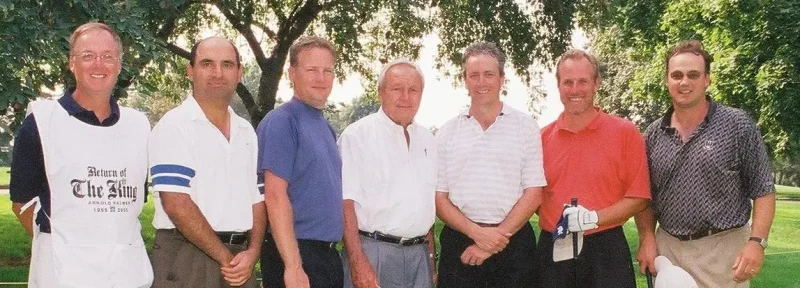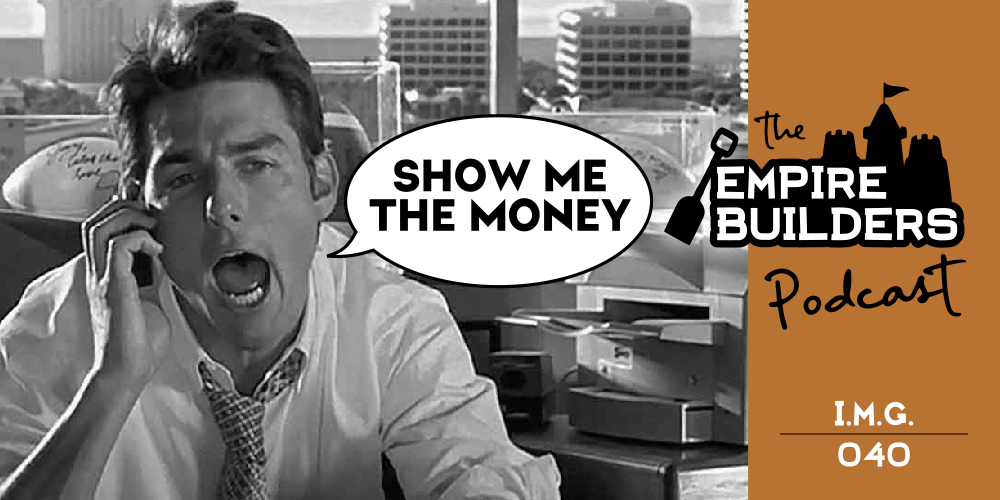Subscribe: Apple Podcasts | Google Podcasts | Amazon Music | Blubrry | RSS | More
Named the most powerful man in sports by Sports Illustrated in 1990, Mark McCormack founded the International Management Group in 1960. He started with Arnold Palmer and grew a sports management empire.
Dave Young:
Here at The Empire Builders Podcast. Stephen Semple, you gave me the topic for this podcast, and I’m flummoxed. International Management Group. Well, it sounds very, very important.
Stephen Semple:
Well, it is.
Dave Young:
I mean, because they’re international and they’re managing, they’re a group. Sometimes we talk about ourselves as the Wizard Of Ads group. We’ve got some partners that just have their name and group after them. So I get it. Who are these people?
Stephen Semple:
Well, here’s what’s really cool about this podcast. Believe it or not, “International Management Group” and “cool,” I’m going to put it together. So watch me, watch me as I do this.
Dave Young:
Okay. Yeah. Yeah.
Stephen Semple:
It’s actually an invention of an entire industry. We are going to actually witness the birth of an industry. That’s pretty cool. A whole industry. So this business was founded by Mark McCormack in 1960, and it’s now owned by a business called Endeavor. They bought it in 2013. It was sold to William Morris Endeavor for $2.3 billion.
Dave Young:
That’s empire sized.
Stephen Semple:
That’s empire size. So this guy started something that never existed before and ended up selling it for $2.3 billion. And there are 3000 employees in 25 countries.
Dave Young:
And I think you gave me a clue, but when you said Endeavor, it’s a talent agency, right?
Stephen Semple:
Gold star. Ring the bell for Dave. Yes. Yes. That’s exactly what it is.
Dave Young:
I somehow have heard of them, these international folks.
Stephen Semple:
You hadn’t ever heard of them. Because what they do is sports management.
Dave Young:
Well, see, if I were a sporting fan, then I would’ve known that.
Stephen Semple:
Yeah. So there you go. So when Mark was young, he was a sports nut, an absolute sports nut. And at the age of six, he got hit by a car, and when he recovered from that, he was told by his doctor you’ll never fully recover. You can’t do any more sports. Sports are done. Now, his dad didn’t view golf as a sport. So his dad bought him some golf clubs and said, hey, you can go play that. And this became his passion so much so that he qualified for the US Open in 1958. So the guy knew how to play the game. And when he was playing at Virginia College, he met another young golfer. And even though you’re not a sports nut, you’ve probably heard of this guy; his name was Arnold Palmer.
Dave Young:
Oh yeah. I have his tea every now and then.
Stephen Semple:
I had a really special opportunity a number of years ago, I had a chance to play a little bit of golf with Arnold Palmer,
Dave Young:
Oh, no kidding.
Stephen Semple:
And I’ll put a picture on the show notes of myself with Arnold Palmer. What it was is he was celebrating, his first professional victory was in Canada, and he was back celebrating that. And I had an opportunity to participate in that. So that was pretty cool. But so basically, one of the people that Mark met when he was at Virginia College was Arnold Palmer. Arnold Palmer headed off to be a professional golfer. Mark headed off to Yale Law School. Then he became a lawyer in Cleveland, but they kept in touch. They were buddies, and they kept in touch. And in 1960, Mark had an idea. Here’s what he noticed. He noticed the rising value of professional athletes. Golf, in particular, was really rising in popularity, and TV was coming on stream.

Stephen Semple:
And he had this idea of how to increase athletes’ earnings. And he started with his buddy Arnold. Here’s what he did. He met with Arnold, and he pitched him this idea of a business that would represent professional golfers. And this idea was actually inspired by Clifford Roberts. Now Clifford Roberts was President Eisenhower’s inner circle man. He was an advisor, a protector, and a counselor. He was there during good and bad. And Mark looked at that and said, this is what professional athletes need. They need somebody who acts in that manner and represents them. Palmer loved the idea. Palmer loved it because it would allow him to focus on golf. And Arnold Palmer talks about this in one of his early books that this allowed him when he was playing a tournament to just focus on the tournament. Palmer liked the idea that he didn’t have to think about the business of golf when he was playing or spending time lining up sponsors or doing all of this other stuff.
Here’s what ended up happening. In the first two years of working with McCormack, Palmer’s endorsements went from $6,000 to $500,000 a year. Palmer won the masters. He golfed with presidents. He endorsed Pennzoil and Hertz. He won the British Open, the PGA, and the US Open. He won 62 tournaments, and he won the grand slam. The man had a huge, huge, huge career. And as I mentioned earlier, his first professional win was the Canadian Open here in Canada. And soon after this, other golfers were approaching McCormack to represent. He ended up representing Gary Player and Jack Nicklaus, which at the time were the three biggest players in golf. And some of the most recognized athletes in the world. He then branched out in other sports, such as tennis and soccer. And he had clients who were Jimmy Connors, Pele, and Tiger Woods. He then even went on to start a television division called Trans World International, and in 1990, McCormack was named the most powerful man in sports by Sports Illustrated. That’s a big deal.
Dave Young:
That’s an empire.
Stephen Semple:
That really is. And in 2003, following his death, Business Age said he invented, Mark McCormack invented the sports business. He started this industry. Now, how often do we get to see that?
Dave Young:
That’s a really cool story, but what’s your takeaway for a small business owner in this?
Stephen Semple:
There are a couple of things here. So first of all, as we often talk about, where you can really find inspiration is by looking somewhere else. And I found it really interesting that the inspiration for this idea was looking at President Eisenhower and saying, wow, President Eisenhower had this guy, boy, wouldn’t it be really interesting if a sports person had this guy? And it was right at the time that he was seeing this growth in this industry. And I just think it was really interesting that he was looking outside of the law. He wasn’t a lawyer. He was looking at sports, which was his passion, right? And just looking outside and saw these things coming together and said, this would be a really interesting business.
Now, granted, he also had a leg up. He had a buddy Arnold Palmer, but it was seeing those things coming together. But the other is, and we’ve talked about this in past podcasts when you can attach your business to revenue, it’s far easier to make money off of it. That’s the other thing he did. It wasn’t that you’re going to have a better quality of your life. And it wasn’t that you’re going to become a better golfer. It’s dude, yes, you’re going to be able to focus on golf, but I’m going to go out and get you your sponsors, which what we know is a professional athlete doesn’t want to do that.
Dave Young:
Kudos to Arnold Palmer for realizing. He could have said, that’s really cool, Mark, but I’m doing all right. I got $6,000 in sponsorship money or endorsement deals and stuff like that. I’m doing all right. But to go to half a million. What he didn’t know was how he was selling himself short. He didn’t have time to talk to everybody about them.
Stephen Semple:
Right.
Dave Young:
Right. So, I mean, I’ve actually had clients tell me that one of the things that they sort of enjoy the most about being Wizard of Ads client is that they don’t have to talk to all the media sales reps that are calling them all the time because they can just give them my number. And they call me, and I say, oh, well they, yeah, go ahead and send me your information and blah, blah, blah. Right. And yeah, I handle all that for the client. And so they can focus on their business, and that’s exactly, like let the athlete focus on the athlete aspect of it.
Stephen Semple:
Focus on playing the game. Now the interesting thing is that’s a sideline benefit that your client gets; that’s a sideline benefit the athlete gets. It’s not why they wrote the check. They wrote the check because it’s like, you’re going to get me more endorsements. Awesome. You’re going to grow my business, Dave. Awesome. I discovered this other thing as well. The other thing I found that was interesting is he was comfortable focusing on one industry first and the industry he knew, which was golf, and then branched out to others later. The lesson here for entrepreneurs to look at is, again, it’s always that look outside the world and see these things and be aware of it and go, boy, how can I pull this together? And then, if you can attach it to a revenue side on a business, you’ve probably got a service that you can go out and sell to people. And who would’ve ever thought, Dave, when we started this, when I said to you, we are going to do a podcast on the International Management Group, that it would actually turn out to be a cool story?
Dave Young:
It really is a cool story. I just think that in instances like that, if there’s some area of expertise that you can, as a business owner or an athlete, there are some things that you can outsource to somebody that really knows what they’re doing. You should do that, especially if they’re tied to revenue.
Stephen Semple:
Yeah. And I remember reading Arnold Palmer’s book. And one of the things that he talked about was it got to the stage where, unless his house was burning down when he was in a tournament, no one called him, and no one talked to him because everything was taken care of.
Dave Young:
Thanks for listening to the podcast. Please share us. Subscribe on your favorite podcast app and leave us a big fat juicy five-star rating and review. And if you have any questions about this or any other podcast episode, email to questions@theempirebuilderspodcast.com.
- Branding Beyond the Gold Rush: The Levi’s Story - December 29, 2025
- Tapping Into the Zeitgeist: Monopoly’s Origin Story - December 17, 2025
- From Mars Men Mediocrity to Sour Patch Success - December 10, 2025

